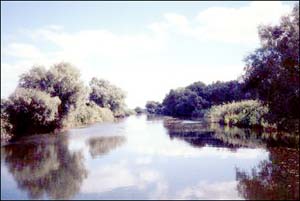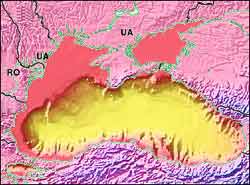Ukraine and Romania Fight Over Oil-Rich Seas
With additional reporting from Dumitru Balaci
(RO), Ivan Khokhotva
(UA) and Oleg
Varfolomeyev (UA)
________________________________
 |
| Danube Delta - river
ends, debate begins
| PRAGUE, Czech Republic--The mighty
Danube river forms a natural boundary at the eastern end of the
Ukrainian-Romanian border. But as the river delta spreads out and
flows into the Black Sea, the political and economic divide - which
should continue for another 230 miles - dissolves with the
freshwater.
While nobody knows exactly where one country ends and the other
begins, both countries now claim larger chunks of the coastal waters
than the other is willing to give up on. It's not beaches they want,
however: it's oil.
If preliminary estimates are correct, there might be as much as
ten million tons of high-quality oil and even more natural gas
underneath the continental shelf of the Black Sea, worth billions of
dollars. Incidentally, the oil field lays right underneath the
unclear Romanian-Ukrainian borderline, around a small rocky outcrop
off the Danube delta, called Serpent Island.
"The matter will be judged only on whether that piece of land
above the sea level is a rock or an island; and that will make a
huge difference on the map," one senior Romanian diplomat said in an
interview with TOL's correspondent. Ukrainians claim it's an island,
and deserves its own coastal waters, but Romania says it's just a
rock, and has no such international legal status.
Since 'coastal waters' also means a 230-mile strip of exclusive
economic rights, that area is huge even though the island itself is
just over a mile (1,7 kilometers) around. At more than 5,000 square
miles, or a third of the size of the Netherlands, the difference in
opinion is enough for the two countries to contemplate taking the
case to the International Court of Justice (ICJ).
"It would of course be desirable to find a compromise on the
bilateral level," said Oleksandr Motsyk, the Ukrainian Foreign
Ministry's deputy state secretary who led the Ukrainian team at
talks with Romania earlier this year. The countries signed a border
treaty, which was hailed a great success despite avoiding border
issues over the seas - the most important part of the debated area.
For that reason, the ICJ might still see Romanian and Ukrainian
lawyers soon. "Referring the matter to the court is also a civilized
way of solving the problem, there is nothing intrinsically wrong
about it," Motsyk said to journalists after the partial border
treaty was signed in mid-June.
When the Crimean Petroleum Company (CPC), a consortium with
exclusive rights to deposits on the Ukrainian side, announced the
extraordinary finds of their oil drills in December 2001, the case
got an unexpected urgency. Ukrainians have since been eager to start
serious probing in the continental shelf, while on the Romanian
side, they have seen the Ukrainian intentions as an outright
territorial challenge.
"[Ukrainians] want to do something even the Soviets did not dare
do: they want to extend their national waters so that Romania will
be virtually left with none," said Ileana Stratulat, head of the
National Agency for Mineral Resources in an interview with TOL's
correspondent.
"They also did two drillings, though both sides signed an
agreement to abstain from it while the demarcation of the sea bed is
pending," Stratulat added.
But the drilling hasn't continued since, the oil has remained 2.5
kilometers under the seabed, and a political solution is yet to
come.
 |
| The Black Sea - oil
under top left red | The
issue is more pressing in Romania, since the country is to resolve
its border disputes with all of its neighbors before it can enter
NATO. Similar prerequisites will apply before the country is
admitted to the European Union as well. Bucharest has been invited
to join the military alliance in 2004, while EU accession is now
projected at 2007 at the earliest.
The Ukraine will not join either of those organizatins in the
foreseeable future. Although they are not as hurried as Romanians,
the oil question keeps Ukrainians on the edge as well. Eager to
start making money, diplomats in Kiev try hard to convince everyone
of Serpent Island's rights to 'island-hood'.
"The island already has a post office, a first-aid station with
two doctors, satellite television, a proper phone network and an
internet link," said Viktor Ostrohlyad, the head of the state-owned
company Ostrovnoye, which is charged with building up the island's
infrastructure.
"Equipment is being brought in to drill water wells, and we have
dispatched a floating crane to install an experimental mussel farm
there," he added. "My staff are working in shifts of 2-4 weeks
there, but at any given time there is an average of 50-60 people on
the island."
The Ukrainian effort does not convince Romanians. "The [place]
has no water resources of its own," said Bogdan Aurescu, judicial
affairs director in the Romanian Ministry of Foreign Affairs. That,
he says, makes it "unfit for island status, that is, the ability to
sustain one's life only with resources naturally found on it."
"Of course, [Ukraininans] are opening a shop here, installing a
fix phone line there, but basically everything having to do with
life is ferried there from the mainland," Aurescu added.
The Ukrainians who live on the small land see the situation
differently. "This place doesn't look like a rock, come and see,"
Ostrohlyad's deputy Volodymyr Yasnyuk, speaking to a TOL
correspondent on the phone from the island, said. "It has unique
flora and fauna, the fertile layer of soil here is 50cm to 1 meter
thick. I have been here for about a month now. Can one live for one
month on a rock?"
Ukraine also plans to finance an archaeological expedition to the
island, a permanent scientific presence and a small museum,
Ostroglyad told TOL. Asked whether he believes the island can
sustain a meaningful economic activity, Ostroglyad said "I don't
just believe such activity is possible. My company is already
involved in this activity."
But for all the dreams of tourists flocking to the island to view
the ruins of an ancient temple of Achilles, and relax at the hotels
and resorts, the nicest dream is of course of oil drilling
platforms. That is what spurred even larger investments - like a $
4m harbor - on an otherwise desolate army outpost.
Under the programme of the island's demilitarization and economic
development, worth at least 20m dollars over the period until 2008,
all existing infrastructure - save for the lighthouse and a border
post - has been transferred to civilians. The island itself has been
incorporated into the administrative region of Odessa.
But as soon as the border issue is resolved, civilians are more
likely to be dressed in oily overalls than Hawaiian shirts.
"Deposits of 10 m tons of oil and 10 bn [cubic meters] of gas
were discovered near the island. The oil discovered is of very high
quality," Alexander's Oil and Gas Connections, an expert news
service, reported shortly after the discoveries in 2001. According
to our calculations, the total assets would sell for well over 4
billion dollars on the global market today. That is roughly an
eighth of Romania's 2002 GDP, and almost a tenth of the Ukraine's in
the same year.
But there is more to be gained than cash. Who gets what here
translates into investment, even a potential economic boom in the
entire region. According to Noam Ayali, a legal expert of such
issues at Chadbourne & Parke, a Washington-based law firm, the
effects might prove much more profound.
"I suspect in this case it's not just the actual amount of oil
involved," Ayali said. "Significant additional economic impact might
be generated if international oil companies were to get involved and
the potential for technology transfer from the international oil
companies to the local Romanian or Ukrainian oil sector [would also
be significant]."
International oil companies are, indeed, interested. JKX Oil
& Gas Plc., a small London-based energy company, already holds a
45 per cent stake in the Crimean Petroleum Company, which has
exclusive rights to explorations on the Ukrainian side. (A Ukrainian
firm, Chernomorneftegaz, owns the remaining 55 per cent.) JKX, at a
market capitalization of just over 40 million Pounds (57m euro, or $
64m) is a relatively small fish in the oil industry. No wonder why
Jackie Range, the company's spokesperson said the opportunity to
exploit a large oil field "would be fantastic news."
"Until the governments resolve their dispute, we are beholden to
them," Ms. Range added. Other, gigantic companies such as Shell or
British Petroleum are also present in the Black Sea, making an
economic boom and expertise import more than a passing possibility -
but those companies, too, would have to get past the obstacles of
diplomacy.
International investment could then bring Ukraine and Romania
what's been called secondary recovery. Since they both lack the
latest production technology, the intensity of production at the
presently working oil and gas fields remains far from the possible
maximum. The rate would gain a sizeable boost in both countries,
well beyond the fields around Serpent
Island.
_______________________________
Originally written for Transitions Online

Copyright 2005 - Missing Link
This site is using the Hazard Area Revisited
theme. |